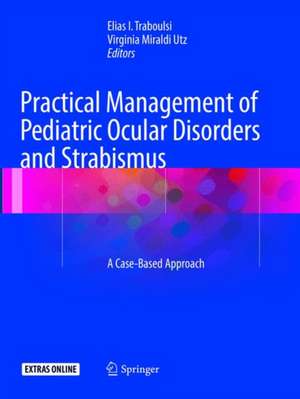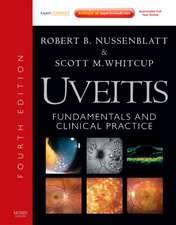Practical Management of Pediatric Ocular Disorders and Strabismus: A Case-based Approach
Editat de Elias Traboulsi, Virginia Utzen Limba Engleză Paperback – 30 mai 2018
Practical Management of Pediatric Ocular Disorders and Strabismus provides the key guiding principles of a traditional textbook in an easy-to-digest format. Each chapter of the text tackles a common or rare clinical situation and begins with the description of an illustrative case. The chapters are structured with sections on case description, differential diagnosis, management and outcomes with a list of possible complications and the approach to their management.
| Toate formatele și edițiile | Preț | Express |
|---|---|---|
| Paperback (1) | 1152.60 lei 38-44 zile | |
| Springer – 30 mai 2018 | 1152.60 lei 38-44 zile | |
| Hardback (1) | 1625.11 lei 38-44 zile | |
| Springer – 28 iul 2016 | 1625.11 lei 38-44 zile |
Preț: 1152.60 lei
Preț vechi: 1213.25 lei
-5% Nou
Puncte Express: 1729
Preț estimativ în valută:
220.54€ • 230.89$ • 182.49£
220.54€ • 230.89$ • 182.49£
Carte tipărită la comandă
Livrare economică 02-08 aprilie
Preluare comenzi: 021 569.72.76
Specificații
ISBN-13: 9781493979721
ISBN-10: 1493979728
Pagini: 822
Ilustrații: XXII, 822 p. 508 illus., 425 illus. in color.
Dimensiuni: 210 x 279 mm
Ediția:Softcover reprint of the original 1st ed. 2016
Editura: Springer
Colecția Springer
Locul publicării:New York, NY, United States
ISBN-10: 1493979728
Pagini: 822
Ilustrații: XXII, 822 p. 508 illus., 425 illus. in color.
Dimensiuni: 210 x 279 mm
Ediția:Softcover reprint of the original 1st ed. 2016
Editura: Springer
Colecția Springer
Locul publicării:New York, NY, United States
Cuprins
Section 1: The Pediatric Clinical Examination.- Chapter 1: Approach to Visual Acuity Assessment and Strabismus Evaluation of the Pediatric Patient.- Chapter 2: Sensorial Adaptations to Strabismus.- Section 2: Refractive Errors.- Chapter 3: Management of Asymptomatic Hypermetropia in Infancy or Early Childhood.- Chapter 4: Myopia.- Chapter 5: Management of Astigmatism in Children.- Chapter 6: Pediatric Contact Lenses for Medical Indications.- Chapter 7: Pediatric Refractive Surgery.- Section 3: Amblyopia.- Chapter 8 Practical Management of Amblyopia.- Section 4: Cornea/Anterior Segment.- Chapter 9: Diagnosis and Management of Conjunctivitis in Infancy and Childhood.- Chapter 10: Diagnosis and Management of Corneal Ulcers in Pediatric Patients.- Chapter 11: Herpes-related Anterior Segment Infections.- Chapter 12: The Anesthetic Cornea and Exposure Keratopathy in Infants and Children.- Chapter 13: Peters Anomaly.- Chapter 14: Anterior Segment DysgenesisSyndromes.- Chapter 15: Management of the Patient with Hyphema.- Chapter 16: Management of Chemical Ocular Injuries in Pediatric Patients.- Chapter 17: Anterior Segment Trauma (Non-chemical).- Section 5: Lens/Cataract.- Chapter 18 Diagnostic Testing for Infantile Cataracts.- Chapter 19 Management of Infantile and Childhood Cataracts.- Chapter 20 Persistence of the Fetal Vasculature: Varieties and Management.- Chapter 21 Evaluation
and Management of the Patient with Subluxated Lenses.- Section 6: Uveitis.- Chapter 22 Uveitis Associated with Juvenile Idiopathic Arthritis.- Chapter 23 Non-infectious Intermediate and Posterior Uveitis.- Chapter 24 Infectious Uveitis.- Chapter 25 Pediatric Masquerade Uveitis.- Section 7: Diagnostic Testing of the Posterior Segment.- Chapter 26 Retinal Imaging for Pediatric Patients.- Chapter 27: Use of Optical Coherence Tomography in the Eyes of Children.- Chapter 28: Electroretinography in Pediatric Retinal Dystrophies.- Section 8: Posterior Segment Disorders.- Chapter 29 Retinopathy of Prematurity.- Chapter 30 Management of Pediatric Posterior Segment Trauma in Children.- Chapter 31 Non-Accidental Trauma: Abusive Head Trauma.- Chapter 32: Screening for Vigabatrin (Sabril ®) Retinal Toxicity in Children.- Section 9: Inherited Disorders.- Chapter 33: Genetic Counseling and Testing.- Chapter 34: Retinal Dystrophies: Clinical Work-up and Selected Examples.- Chapter 35: Inherited Vascular Disorders.- Chapter 36: The Phakomatoses.- Chapter 37: Retinoblastoma.- Section 10: Optic Nerve Disorders.- Chapter 38 Optic Nerve Malformations.- Chapter 39 Evaluation and Management of Optic Pathway Gliomas.- Chapter 40 Pediatric Pseudotumor Cerebri Syndrome.- Chapter 41 Optic Neuritis in Children.- Chapter 42 Childhood Glaucoma.- Chapter 43 Aphakic/Pseudophakic Glaucoma.- Chapter 44 Diagnosis and Management of Juvenile Open Angle Glaucoma.- Section 11: Strabismus, Neuro-paralytic Disorders.- Chapter 45 Diagnosisand Management of Infantile Esotropia.- Chapter 46 Diagnostic Challenges in Acquired Non-Accommodative Esotropia.- Chapter 47 Management of Accommodative Esotropia.- Chapter 48 Sixth Nerve Palsy in Children.- Chapter 49 Diagnosis and Management of Fourth Nerve Palsy in Children.- Chapter 50 Cranial Nerve III Palsy in Children.- Chapter 51 Management of Exotropia in Childhood.- Chapter 52 Duane Retraction Syndrome.- Chapter 53 Management of Strabismus in Thyroid Eye Disease.- Chapter 54 A and V Pattern Strabismus.- Chapter 55 Congenital Cranial Dysinnervation Disorders.- Chapter 56 Differential Diagnosis and Management of Hyperdeviations: Non-4th Nerve Palsy - Dissociated Vertical Deviations and Skew Deviations.- Chapter 57 Approaches to Strabismus Reoperation.- Chapter 58 Brown Syndrome.- Chapter 59 Acute Strabismus.- Chapter 60 Complications of Strabismus Surgery.- Section 12: Eyelid, Orbit and Lacrimal Disorders.- Chapter 61 Nasolacrimal Duct Obstruction.- Chapter 62 Management of Blepharoptosis in Infancy and Childhood.- Chapter 63 Preseptal and Orbital Cellulitis.- Chapter 64 Current Management of Inferior Orbital Wall Fractures in Children.- Chapter 65 Non-Infectious Causes of Proptosis in Children.- Chapter 66 Craniosynostosis and Congenital Craniofacial Disorders.- Chapter 67 Supplement: Special Considerations in the Management of Amblyopia and Strabismus inCraniofacial Disorders.- Section 13: Patients with Special Needs- Chapter 68 Management of Vision Impairment in Children.- Chapter 69 Down Syndrome.- Section 14: Nystagmus.- Chapter 70 Nystagmus in Pediatric Age Group: Clinical Features and Management.- Section 15: Non-organic Vision Loss.- Chapter 71 Non-Organic Vision Loss.- Appendices.- Appendix 1 Prescribing Practices for Refractive Errors in Pediatric Patients.- Appendix 2 Basic Retinoscopy.- Appendix 3 Dynamic Retinoscopy.- Appendix 4 Strategies for the Child Who Would Not Wear Glasses.- Appendix 5 Prescribing Prisms forPediatric Patients.- Appendix 6 Pathogens and Medications for Infectious Conjunctivitis in Children.- Appendix 7 Medications Commonly Used in Allergic Conjunctivitis Treatment.- Appendix 8 IOL Power Selection for Children.- Appendix 9 Measuring Axial Eye Length in Children.- Appendix 10 Surgical Instrumentation in Strabismus Surgery.- Appendix 11 Surgical Planning and Numbers.- Appendix 12 ROP Examination and Treatment Pearls.- Appendix 13 ROP Follow-up Schedule.- Appendix 14 Pseudotumor Cerebri Diagnostic Criteria.- Appendix 15 Anisocoria.Recenzii
“There is extensive coverage of both common and uncommon disorders, which should be of great benefit to trainees as well as comprehensive ophthalmologists who may encounter patients with these conditions very infrequently. … this book has achieved its goal of providing a practical guide written by expert authors in a style accessible to residents, fellows, and comprehensive ophthalmologists. … pediatric phthalmologists also would benefit from the tips and descriptions regarding patients with less common and/or more challenging disorders.” (Prem S. Subramanian, Graefe's Archive for Clinical and Experimental Ophthalmology, Vol. 256 (3), March, 2018)
“This extensive text is a new addition to a small groupof noted pedicatric ophthalmology texts. Drs. Traboulsi and Utz have edited a book that is worthy of this group. … The text is well supplied with case studies/examples that illustrate and emphasize nicely, as intended. ... It is designed as a practical tool to enhance management. It succeeds very well at this. The casual user should be extremely pleased.” (James D. Reynolds, American Orthoptic Journal, Vol. 67, 2017)
Notă biografică
Editors:
Elias I. Traboulsi, M.D., M.Ed
Professor of Ophthalmology
Cleveland Clinic
Cole Eye Institute
Cleveland, Ohio
Virginia Miraldi Utz, MD
Assistant Professor of Pediatric Ophthalmology and Adult Strabismus
Cincinnati Children’s Hospital Medical Center
Abrahamson Pediatric Eye Institute
Cincinnati, Ohio
Michelle M. Arris, MD
Assistant Professor of Ophthalmology
Children’s Mercy Hospitals & Clinics
Department of Ophthalmology
Kansas City, Missouri
Caracteristici
Case-based approach to the management of pediatric eye diseases and strabismus Teaches the novice, as well as the experienced surgeon, how to conceptualize and analyze surgical planning to maximize patient outcomes Allows readers to “get inside the head of the surgeon” Individual cases with clear instructions and an abundance of color illustrations Written by experts in the field Teaches critical information one case at a time Provides the key guiding principles of a traditional textbook in an easy-to-digest format Each chapter tackles a common or rare clinical situation and begins with the description of an illustrative case Chapters structured with sections on case description, differential diagnosis, management and outcomes with a list of possible complications and the approach to their management








